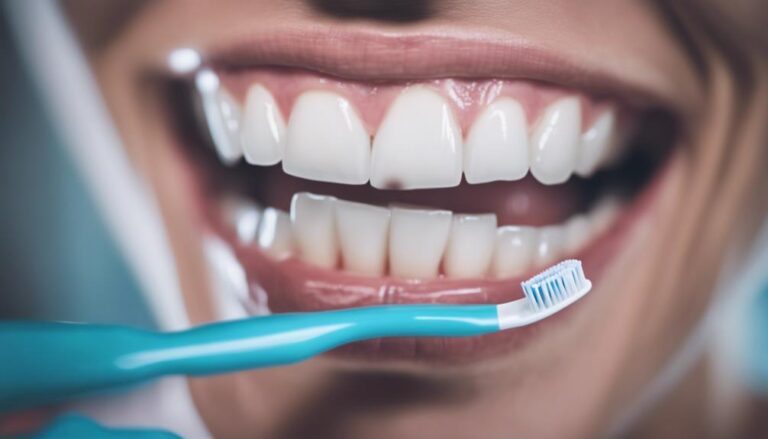Choosing the right toothpaste is vital for preventing gum disease. Opt for fluoride toothpaste for bacteria combat and enamel strength. Herbal toothpastes with neem and tea tree oil offer natural antibacterial properties. Tartar control toothpaste prevents buildup for good gum health. Antibacterial toothpaste targets harmful bacteria, reducing plaque and gingivitis risk. Natural toothpaste, derived from plants, is ideal for sensitive gums. Consider these options for effective gum disease prevention.
Key Takeaways
- Fluoride toothpaste: Strengthens enamel, reverses gum disease signs, inhibits bacterial growth.
- Herbal toothpaste: Natural antibacterial properties, reduces plaque, soothes gum irritation.
- Tartar control toothpaste: Prevents tartar buildup, maintains gum health.
- Antibacterial toothpaste: Eliminates harmful bacteria, reduces plaque, prevents gingivitis.
- Enamel protection toothpaste: Strengthens enamel, promotes gum health, prevents cavities.
Fluoride Toothpastes
When choosing a toothpaste for gum disease, I recommend opting for fluoride toothpastes to effectively combat bacteria and strengthen tooth enamel. Fluoride provides significant benefits in dental care, especially in preventing and reversing early signs of gum disease.
Despite misconceptions surrounding fluoride, research supports its efficacy in reducing cavities and improving oral health. Fluoride works by remineralizing weakened tooth enamel, making it more resistant to acid attacks from plaque bacteria. This mineral also inhibits the growth of bacteria that contribute to gum disease, helping to maintain a healthy balance in the mouth.
Fluoride toothpaste is a cornerstone in oral hygiene routines due to its proven effectiveness. While some may consider natural or herbal alternatives, fluoride toothpaste remains the gold standard for preventing gum disease and maintaining excellent oral health. Its ability to strengthen enamel, fight bacteria, and prevent cavities makes it an essential component in combating gum disease.
It’s crucial to choose toothpaste with fluoride to guarantee the best protection against gum disease and overall oral health.
Herbal Toothpastes
Using herbal toothpastes can offer a natural alternative in maintaining oral hygiene and promoting gum health. Herbal toothpaste benefits stem from their natural ingredients, such as neem, tea tree oil, and peppermint, which possess antibacterial and anti-inflammatory properties that can help reduce plaque buildup and soothe gum irritation. These toothpastes often lack harsh chemicals commonly found in traditional toothpaste formulations, appealing to those seeking a more holistic approach to oral care.
When selecting herbal toothpaste, it’s crucial to take into account the specific herbal toothpaste ingredients. Look for ingredients like neem, known for its antimicrobial properties, which can help combat bacteria in the mouth. Tea tree oil is another powerful ingredient that can assist in reducing inflammation and fighting oral bacteria. Additionally, peppermint oil provides a revitalizing flavor and can leave your mouth feeling clean and fresh.
Tartar Control Toothpastes
Herbal toothpastes offer a natural approach to oral care. Moving on to the discussion on Tartar Control Toothpastes, these products are specifically formulated to help prevent the buildup of tartar on teeth. Tartar, also known as dental calculus, is a hardened form of dental plaque that can only be removed by a dental professional. Preventing tartar buildup is important for maintaining good gum health and overall oral hygiene.
Tartar control toothpastes contain active ingredients such as pyrophosphate and zinc citrate that work to inhibit the mineralization of plaque, thereby reducing tartar formation. Regular use of these toothpastes can help in tartar prevention, leading to healthier gums and preventing potential gum diseases.
In addition to daily brushing and flossing, incorporating a tartar control toothpaste into your oral care routine can be advantageous, especially if you’re prone to tartar buildup. Remember, maintaining proper oral hygiene is essential for gum health and overall well-being. Choose a tartar control toothpaste that suits your needs and preferences to support your oral health regimen effectively.
Antibacterial Toothpastes
Antibacterial toothpastes play a crucial role in combating harmful bacteria that can contribute to gum disease and other oral health issues. These toothpastes contain specific ingredients that target and eliminate bacteria, promoting a healthier oral environment.
Here are some key points highlighting why antibacterial toothpastes are beneficial for maintaining excellent oral health:
- Bacteria fighting ingredients: Antibacterial toothpastes typically contain active ingredients such as triclosan, fluoride, or essential oils like tea tree oil, which are effective in killing bacteria that cause gum disease and cavities.
- Oral health benefits: Regular use of antibacterial toothpaste can help reduce plaque buildup, prevent gingivitis, and protect against periodontal disease by controlling the growth of harmful bacteria in the mouth.
- Overall protection: By incorporating an antibacterial toothpaste into your daily oral care routine, you can enhance the effectiveness of your dental hygiene practices and safeguard your gums from infections and inflammation.
Natural Toothpastes
Natural toothpastes, derived from plant-based ingredients and free from artificial additives, offer a complete yet invigorating alternative for oral care. These toothpastes harness the benefits of natural ingredients like tea tree oil, peppermint, and coconut oil to provide a revitalizing and soothing experience while promoting oral health. The absence of harsh chemicals in natural toothpastes may be particularly beneficial for individuals with sensitive gums or allergies to certain ingredients commonly found in traditional toothpaste formulations.
When considering the effectiveness of natural toothpastes, it’s essential to look at reviews from consumers who’ve used these products. Many users report positive experiences with natural toothpastes, noting improvements in gum health, fresher breath, and a cleaner feeling after use. While natural toothpastes may not foam as much as conventional options due to the absence of certain foaming agents, they still provide a thorough clean and leave the mouth feeling invigorated.
For those seeking alternatives to traditional toothpaste, natural options can be a compelling choice, offering a more holistic approach to oral care. Recommendations from dental professionals may further support the use of natural toothpastes as part of a complete oral hygiene routine.
Whitening Toothpastes
Whitening toothpastes are formulated to help brighten and remove stains from teeth, enhancing the overall appearance of one’s smile. When choosing a whitening toothpaste, consider the following options:
- Stain fighting toothpastes: Look for toothpaste products specifically designed to target and eliminate stains caused by coffee, tea, or tobacco use. These toothpastes often contain abrasive ingredients or chemical agents that help scrub away surface stains, revealing whiter teeth.
- Whitening toothpastes: These toothpastes typically contain ingredients like hydrogen peroxide or carbamide peroxide, which are known for their whitening properties. They work by breaking down stains on the surface of the teeth, leading to a brighter smile over time.
- Natural whitening formulas: For those who prefer fluoride-free options or are looking for more natural alternatives, there are toothpastes available that use natural ingredients like baking soda, activated charcoal, or coconut oil to help whiten teeth gently and without harsh chemicals.
Sensitive Teeth Toothpastes
Sensitive teeth toothpastes aim to provide relief and protection for individuals experiencing discomfort or pain when consuming hot, cold, or sweet foods and beverages. These toothpastes are specifically formulated to help with sensitivity relief by desensitizing nerve endings in the teeth, making it more comfortable to eat and drink without experiencing sharp pain. Additionally, many sensitive teeth toothpastes also focus on gum health, as gum problems can exacerbate tooth sensitivity.
When choosing a toothpaste for sensitive teeth, look for active ingredients like potassium nitrate or strontium chloride, which are known for their desensitizing properties. These ingredients work by blocking the transmission of pain signals from the surface of the tooth to the nerve. Moreover, sensitive teeth toothpastes often contain fluoride to help strengthen enamel and protect against decay, which is essential for maintaining overall oral health.
Enamel Protection Toothpastes
Toothpastes designed for enamel protection play an important role in maintaining the strength and integrity of teeth against daily wear and tear. Enamel, the outer layer of the teeth, serves as a protective barrier against decay and damage. Enamel protection toothpastes are specially formulated to help strengthen this important layer, promoting overall dental health.
Here are key benefits of using enamel protection toothpastes:
- Enamel Strengthening: These toothpastes often contain ingredients like fluoride and calcium phosphate, which aid in remineralizing and strengthening enamel, making teeth more resistant to acid attacks and erosion.
- Gum Health: Strong enamel is crucial for gum health as well. By protecting the enamel, these toothpastes can help prevent issues like gum recession and sensitivity, promoting a healthier oral environment.
- Cavity Prevention: With reinforced enamel, the likelihood of developing cavities decreases, leading to better overall dental health and reduced dental visits.
Using enamel protection toothpastes is a proactive step towards maintaining strong teeth and healthy gums.
Probiotic Toothpastes
Enhancing oral health through innovative formulations, probiotic toothpastes offer a unique approach to promoting a balanced oral microbiome. These gut health toothpastes contain beneficial bacteria that can help restore harmony in the oral microbiome, potentially reducing the risk of gum disease. By introducing good bacteria into the mouth, probiotic toothpastes may help combat harmful bacteria that can lead to inflammation and periodontal issues.
Studies suggest that probiotic toothpastes can be effective in reducing plaque accumulation, improving gum health, and even combating bad breath by restoring microbial balance in the mouth. These oral microbiome toothpastes work by introducing strains of bacteria that are known to be beneficial for oral health, contributing to a healthier overall oral environment.
When considering probiotic toothpastes, it’s important to choose products that have been clinically tested and proven to be effective. Incorporating probiotic toothpaste into your oral care routine may offer additional support in maintaining a healthy mouth and preventing gum disease.
Charcoal Toothpastes
Innovatively formulated with activated charcoal, toothpastes containing this ingredient have gained popularity in oral care routines due to their potential benefits for oral health. Activated charcoal is known for its ability to bind to toxins and impurities, which may help in removing surface stains and plaque from teeth effectively. However, it’s important to take into account some myths surrounding charcoal toothpaste, such as it being too abrasive for daily use.
- Charcoal Toothpaste Benefits:
- Effective stain removal.
- Potential plaque reduction.
- Freshens breath.
Charcoal toothpaste has seen a surge in popularity in recent years due to its unique properties and the increasing interest in natural oral care solutions. While it can be a beneficial addition to your oral hygiene routine, it’s vital to use it in moderation and not as a replacement for traditional fluoride toothpaste. Stay informed about the latest oral health trends, but always consult with your dentist to make sure you’re using products that are safe and effective for your individual needs.
Clinically Proven Toothpastes
Clinically validated toothpaste formulations have demonstrated efficacy in promoting excellent oral health through rigorous scientific testing and research. These toothpastes offer a range of clinical benefits supported by robust scientific evidence. When choosing a toothpaste with proven clinical benefits, look for ingredients like fluoride, which is known to strengthen enamel and prevent tooth decay. Scientific studies have consistently shown that fluoride toothpaste helps reduce the risk of cavities and supports overall oral health.
Another key ingredient to seek in clinically proven toothpastes is triclosan. This antimicrobial agent has been shown to effectively combat harmful bacteria in the mouth, reducing the risk of gum disease and promoting healthy gums. Additionally, toothpaste formulations containing stannous fluoride have demonstrated efficacy in fighting plaque and gingivitis, further underscoring their clinical benefits.
Non-Alcohol Toothpastes
Utilizing non-alcohol toothpastes can be beneficial for individuals seeking oral care products without the potential drying effects of alcohol. These toothpastes provide safe alternatives for maintaining oral hygiene while harnessing the benefits of natural ingredients. Here are some key points to take into account:
- Gentle Formulation: Non-alcohol toothpastes are often formulated to be gentle on the gums, making them suitable for individuals with sensitive oral tissues.
- Moisturizing Properties: Many non-alcohol toothpastes contain natural ingredients like aloe vera or coconut oil, which can help moisturize the mouth and prevent dryness.
- Reduced Irritation: By avoiding alcohol-based formulas, these toothpastes can minimize the risk of irritation for those prone to oral sensitivity.
Choosing a non-alcohol toothpaste can be a wise decision for individuals looking to maintain a healthy oral care routine without the potential drawbacks of alcohol-containing products. The use of natural ingredients in these toothpastes can provide effective cleaning while promoting overall oral health.
Desensitizing Toothpastes
Desensitizing toothpastes are formulated to alleviate tooth sensitivity by targeting nerve endings and strengthening enamel. The effectiveness of desensitizing toothpastes lies in their key ingredients, such as potassium nitrate, stannous fluoride, and strontium chloride. These ingredients work by blocking the nerve signals that cause pain and by forming a protective barrier over the sensitive areas of the teeth. Potassium nitrate, for example, helps to calm the nerves inside the tooth, reducing sensitivity to hot or cold temperatures. Stannous fluoride not only helps with sensitivity but also provides additional benefits like fighting cavities and gingivitis. Strontium chloride, on the other hand, helps to block the tubules in the teeth that lead to the nerves, further reducing sensitivity.
When using desensitizing toothpastes, it’s essential to follow the recommended application frequency. Typically, these toothpastes are used twice daily for best results. Consistent use is key to maintaining the protective barrier and ensuring long-lasting relief from tooth sensitivity.
Extra Fresh Toothpastes
When searching for an invigorating oral care experience, some toothpaste options offer an extra minty sensation that goes beyond basic cleaning. Minty fresh toothpastes can provide a burst of minty coolness that leaves your mouth feeling revitalized.
Here are three reasons why these toothpastes can be a great addition to your oral care routine:
- Long-lasting Freshness: Minty fresh toothpastes often contain ingredients like menthol or peppermint that leave a lingering coolness in your mouth, providing long-lasting minty breath throughout the day.
- Improved Taste: The invigorating taste of mint can make your brushing experience more enjoyable, encouraging you to brush for the recommended two minutes, ensuring a thorough clean.
- DIY Toothpaste Recipes: For those who prefer natural alternatives, DIY toothpaste recipes with minty ingredients like baking soda and peppermint oil can be a great way to achieve that extra minty feeling without artificial additives.
Incorporating minty fresh toothpastes or exploring DIY toothpaste recipes can enhance your oral care routine, leaving your mouth feeling clean and refreshed.
Customized Toothpastes
Customized toothpastes offer tailored solutions to address specific oral health needs and preferences. These toothpastes are designed with personalized formulas that cater to individual requirements, making them a highly effective choice for maintaining oral hygiene. By incorporating specialty ingredients, customized toothpastes can target particular issues such as sensitivity, enamel protection, or whitening.
Personalized formulas in customized toothpastes allow for the inclusion of specific components that cater to unique oral health concerns. Whether someone needs extra fluoride for cavity prevention, antibacterial agents for gum disease, or desensitizing ingredients for sensitive teeth, a customized toothpaste can provide targeted solutions.
Furthermore, the integration of specialty ingredients like xylitol, potassium nitrate, or stannous fluoride enhances the toothpaste’s efficacy in addressing specific oral health issues. These ingredients work synergistically to promote gum health, strengthen enamel, and combat bacteria, providing a thorough approach to oral care. Customized toothpastes are a valuable addition to a daily oral hygiene routine, offering personalized solutions for maintaining an excellent dental health.
Frequently Asked Questions
Can Toothpaste Prevent Gum Disease Completely?
Toothpaste is effective in preventing gum disease to a certain extent. However, it’s not a foolproof solution. Regular use of recommended toothpaste can support long-term gum health, but professional dental care and good oral hygiene practices are essential for complete prevention.
Are There Any Side Effects of Using These Toothpastes?
It is crucial to check for any adverse reactions when using these toothpastes, as they can pose potential risks like allergic reactions or sensitivity. However, the benefits such as preventing gum disease outweigh these concerns. Long-term effects depend on ingredients. Be sure to look out for any adverse reactions.
How Often Should I Switch Between Different Toothpastes?
I believe toothpaste rotation can be beneficial for oral health. While it may offer different benefits, drawbacks include potential sensitivity. Long-term effects are unclear, but effectiveness might vary. Consulting a dentist is wise.
Can Children and Adults Use the Same Toothpaste?
Absolutely, children and adults can use the same toothpaste as long as it is age-appropriate. Different brands offer various benefits, so choose one that suits your needs. Consider effectiveness and ingredients to guarantee the best dental health for all ages.
Are There Any Specific Toothpaste Ingredients to Avoid for Gum Health?
When it comes to gum health, it’s important to avoid toothpaste with high sugar content or excessive abrasiveness. Look for fluoride for safety and consider natural alternatives. These choices can impact gum health significantly.
Conclusion
Just as a sturdy ship needs a reliable anchor to weather the stormy seas, our gums need effective toothpastes to prevent gum disease. Choose wisely from fluoride, herbal, tartar control, antibacterial, and natural toothpastes to keep your oral health on course.
Remember, a small daily investment in your dental care can lead to a lifetime of healthy smiles. Choose the right toothpaste to be the anchor for your gum health journey.






